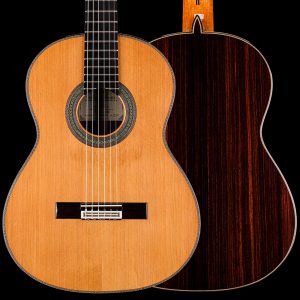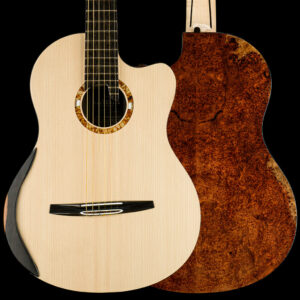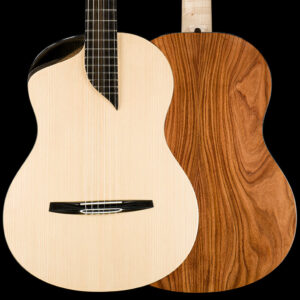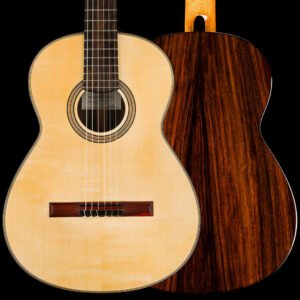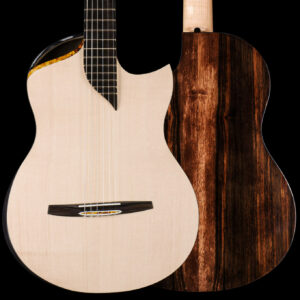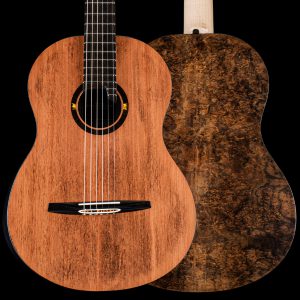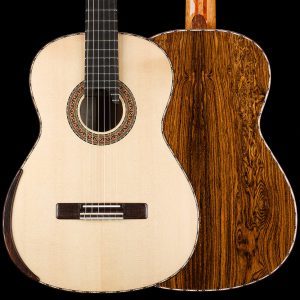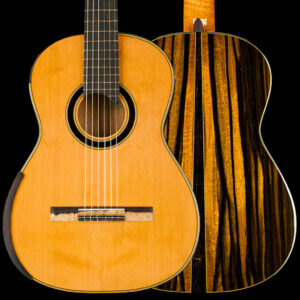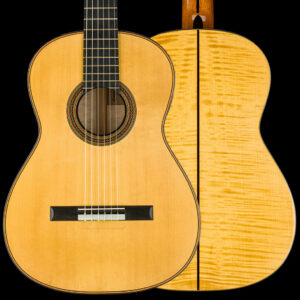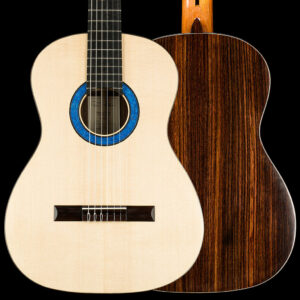The Top 10 Classical Guitarists of All Time
The giants on whose shoulders we stand now
The classical guitar is a timeless instrument known for its exquisite sound and versatility. Over the centuries, countless virtuosos have graced the world with their exceptional talent, leaving an indelible mark on the world of music. Here, we celebrate the top 10 classical guitarists of all time, whose contributions continue to inspire and captivate audiences worldwide.
Andrés Segovia is often hailed as the father of modern classical guitar, and his profound influence on the instrument’s development is impossible to overstate. Born in Linares, Spain, on February 21, 1893, Segovia’s journey as a guitarist began when he received his first guitar at the age of ten. Little did anyone know that this young boy would go on to redefine the world of classical music.
Segovia’s early encounters with the guitar were marked by the limitations of the instrument at the time. The guitar was considered a folk instrument, and its potential as a classical instrument was largely unexplored. However, Segovia was determined to change this perception. He embarked on a lifelong mission to elevate the guitar’s status and expand its repertoire.
One of Segovia’s most remarkable qualities was his technical prowess. He meticulously developed and refined his playing technique, which became the foundation for modern classical guitar technique. His innovations included the use of nails rather than fingertips to pluck the strings, allowing for greater precision and volume. Segovia’s flawless technique set new standards for guitarists worldwide.
Segovia’s dedication to expanding the guitar’s repertoire was nothing short of extraordinary. He tirelessly transcribed and adapted works originally written for other instruments, such as the lute and piano, for the guitar. These efforts introduced classical guitarists to a vast treasury of music, including pieces by composers like Johann Sebastian Bach, Isaac Albéniz, and Fernando Sor.
Segovia’s talents took him on numerous world tours, where he captivated audiences with his artistry. He performed in prestigious concert halls and collaborated with renowned composers and musicians, further solidifying the guitar’s place in classical music. His worldwide recognition as a virtuoso elevated the guitar to unprecedented heights. Shortly he began to be recognized as one of the best classical guitarits ever.
Andrés Segovia’s legacy lives on not only through his recordings but also through the countless guitarists he inspired. Many of today’s greatest guitarists cite Segovia as a primary influence, and his teaching and advocacy for the instrument have left an indelible mark on the classical guitar community. His students, including John Williams and Christopher Parkening, went on to become celebrated performers and educators themselves.
Andrés Segovia’s tireless dedication to the classical guitar transformed it from a humble folk instrument into a respected member of the classical music family. His pioneering spirit, technical brilliance, and unwavering commitment to expanding the instrument’s repertoire continue to inspire generations of guitarists. Segovia’s enduring influence ensures that his name will forever be synonymous with the artistry and advancement of the classical guitar.
Francisco de Asís Tárrega y Eixea was born on November 21, 1852, in Villarreal, Spain. He came from a musical family and began playing the guitar at an early age, receiving his first lessons from his father. However, his musical journey truly took off when he moved to Valencia to study music and guitar.
Tárrega was instrumental in refining and advancing classical guitar technique during the late 19th century. His contributions include the development of a rest stroke technique known as “Tárrega’s rest stroke,” which involved plucking the string and resting the finger on the adjacent string. This technique enhanced the clarity and volume of guitar music, allowing for a more expressive and dynamic range of playing.
One of Tárrega’s enduring legacies is his remarkable compositions for the guitar. His works seamlessly blend technical virtuosity with deep emotional expression. Some of his most famous compositions include:
Tárrega’s influence extended beyond his performances and compositions. He was a dedicated teacher who played a crucial role in shaping the next generation of guitarists. His teaching methods emphasized a solid technical foundation, phrasing, and interpretation, ensuring that his students not only played proficiently but also conveyed the depth of the music.
Francisco Tárrega’s impact on the classical guitar is immeasurable. His innovations in technique, compositions, and teaching methods continue to shape the way classical guitar is played and taught today. Many of his compositions remain staples in the repertoire, and his legacy lives on through the countless guitarists who have been inspired by his work.
In conclusion, Francisco Tárrega’s contributions to classical guitar go beyond his own lifetime. He elevated the instrument to new heights, leaving a lasting legacy that continues to inspire and shape the world of classical guitar for generations to come. His compositions and techniques remain a testament to the enduring power of music to convey profound emotions and connect with audiences on a deep, emotional level.
Julian Alexander Bream was born on July 15, 1933, in London, England, into a musical family. His father, Henry Bream, was a successful jazz musician, and his mother, Violet Bream, was a talented amateur pianist. Julian’s exposure to music from an early age set the stage for his remarkable career as a classical guitarist.
Julian Bream’s journey with the guitar began at the age of eleven when he received his first instrument. He displayed prodigious talent, and his father recognized his potential, providing him with rigorous musical training. Bream’s early influences were diverse, encompassing not only classical music but also jazz and contemporary styles, which would later contribute to his unique approach to the guitar.
Bream’s virtuosity on the guitar was awe-inspiring. His technical precision, exquisite tone control, and remarkable phrasing set him apart as one of the premier classical guitarists of his time. He had the ability to make the guitar sing with both power and subtlety, crafting performances that were emotionally evocative and technically flawless.
One of Julian Bream’s most significant contributions was his dedication to expanding the classical guitar repertoire. He commissioned numerous works from contemporary composers, helping to create a substantial body of modern guitar literature. His collaborations with composers such as Benjamin Britten and William Walton resulted in compositions that pushed the boundaries of what the guitar could achieve.
Bream’s musical explorations extended beyond classical guitar. He was known for his proficiency on the lute and other historical plucked instruments, reviving interest in early music. His efforts in bringing Renaissance and Baroque music to modern audiences helped bridge the gap between historical and contemporary musical traditions.
Julian Bream’s contributions to music earned him numerous accolades, including Grammy Awards, international recognition, and an honorary doctorate from the University of Surrey. His recordings, spanning a wide range of repertoire, remain cherished by guitar enthusiasts and continue to inspire guitarists worldwide.
Julian Bream’s impact on the world of classical guitar is immeasurable. His virtuosity, interpretive skill, and dedication to expanding the instrument’s repertoire have left an enduring legacy. His influence extended not only to guitarists but also to composers and musicians in various genres. Bream’s ability to transcend boundaries and explore the full range of the guitar’s expressive possibilities makes him a true visionary in the world of music.
Even after his passing in 2020, Julian Bream’s recordings and contributions continue to be celebrated, ensuring that his legacy as a master classical guitarist and musical explorer will endure for generations to come. His passion for the guitar and his dedication to pushing its boundaries serve as an inspiration for musicians and a testament to the power of music to transcend time and place.
John Christopher Williams was born on April 24, 1941, in Melbourne, Australia, into a family of musicians. His father, Len Williams, was a guitar teacher, and his mother, Malaan, was a skilled pianist. This musical upbringing laid the foundation for John’s remarkable career as a classical guitarist.
John Williams’ guitar education began at an early age under the guidance of his father. His exceptional talent was evident, and he quickly gained recognition for his prodigious abilities. At the age of twelve, he made his public debut, performing at a local concert. His musical journey had begun.
To further develop his skills, John Williams traveled to Spain to study with the legendary Spanish guitarist Andrés Segovia. Under Segovia’s tutelage, Williams honed his technique, deepened his musical understanding, and broadened his repertoire. Segovia’s influence left an indelible mark on Williams’ playing style.
John Williams’ virtuosity on the classical guitar is unparalleled. His performances are characterized by impeccable technical precision, a rich and expressive tone, and a deep understanding of musical phrasing. He possesses the unique ability to infuse every note with emotion, captivating audiences with his artistry.
One of Williams’ distinguishing features as a classical guitarist is his diverse repertoire. He has tackled a wide range of musical styles, from the Baroque compositions of Bach to the Romantic works of Tarrega, and even ventured into contemporary and world music. His ability to masterfully interpret and convey the essence of each style has earned him universal acclaim.
Throughout his career, John Williams has collaborated with esteemed musicians from various genres, demonstrating the versatility of the classical guitar. He has performed with orchestras, chamber ensembles, and vocalists, showcasing the guitar’s adaptability in different musical contexts. His extensive discography includes numerous critically acclaimed recordings that have earned him multiple awards.
John Williams’ contributions to classical music have not gone unnoticed. He has received numerous awards and honors, including multiple Grammy Awards, a Brit Award, and an appointment as a Commander of the Order of the British Empire (CBE) for his services to music.
In addition to his performing career, John Williams is a dedicated teacher and educator. He has imparted his knowledge and expertise to countless aspiring guitarists, nurturing the next generation of classical musicians.
John Williams’ impact on the classical guitar world is immeasurable. His technical brilliance, interpretive artistry, and commitment to musical excellence have elevated the guitar to new heights. His extensive and diverse repertoire, collaborations with musicians from various genres, and dedication to teaching make him a true ambassador of classical music.
As John Williams continues to perform and inspire audiences worldwide, his legacy as a virtuoso of the classical guitar remains firmly established. His contributions to the artistry and advancement of the instrument ensure that his name will forever be synonymous with the beauty and power of classical guitar music.
Visit John’s website with some free guitar scores.
David Russell was born on July 30, 1953, in Glasgow, Scotland, into a family of musicians. His father was a music teacher, and his mother was a pianist, providing him with an early exposure to music. Russell’s journey with the guitar began at the age of five when he received his first guitar as a gift from his father.
Russell’s early guitar education was nurtured by his father, who provided him with a solid foundation in both technique and musicality. His studies continued at the Royal Academy of Music in London and later at the Royal Conservatory of Music in Madrid, Spain. His immersion in Spanish culture and guitar tradition would deeply influence his playing style.
One of the hallmarks of David Russell’s playing is his virtuosic technique. His mastery of the instrument allows him to navigate intricate passages with ease and precision. His performances are characterized by flawless execution, a crystalline tone, and a remarkable ability to bring out the nuances of the music.
David Russell’s repertoire is vast and eclectic, encompassing works from various musical eras and styles. He is known for his interpretations of Spanish and Latin American music, including compositions by Isaac Albéniz, Enrique Granados, and Astor Piazzolla. However, his repertoire extends beyond these genres, encompassing classical works by composers like Bach, Mozart, and Schubert.
Russell’s discography includes numerous critically acclaimed recordings that have earned him recognition and awards, including Grammy Awards. His recordings often showcase his commitment to preserving and interpreting the classical guitar’s rich heritage while also exploring new musical territories.
While deeply rooted in the classical tradition, David Russell has also shown a commitment to contemporary music. He has premiered works by modern composers and continues to champion new compositions for the guitar, contributing to the instrument’s evolving repertoire.
Russell’s career has taken him to renowned concert halls and festivals worldwide. His live performances are highly anticipated events, drawing audiences with his captivating stage presence and musical depth. His ability to connect with listeners on a profound emotional level is a testament to his artistry.
In addition to his performing career, David Russell is a dedicated teacher and mentor. He has conducted masterclasses and workshops, sharing his knowledge and expertise with aspiring guitarists. His commitment to education ensures the preservation and growth of classical guitar traditions.
David Russell’s contributions to the classical guitar are extraordinary. His virtuosity, technical prowess, and musicality have solidified his place among the greatest guitarists of our time. His expansive repertoire, dedication to contemporary music, and commitment to education make him a multifaceted figure in the classical guitar world.
As David Russell continues to perform, record, and inspire audiences worldwide, his legacy as a virtuoso of the classical guitar remains deeply rooted in the beauty and power of music. His remarkable ability to convey emotion through his instrument ensures that his name will be celebrated for generations to come, as he continues to shape and elevate the world of classical guitar music.
Sharon Isbin was born on August 7, 1956, in Minneapolis, Minnesota, and began playing the guitar at a young age. Her early exposure to a diverse range of musical styles, including classical, folk, and rock, laid the foundation for her unique approach to the guitar.
Isbin’s early education in classical guitar took her to prestigious institutions, including the Aspen Music Festival and the Juilliard School, where she studied with noted guitarists and composers. Her dedication and talent quickly became evident, propelling her to the forefront of the classical guitar world.
One of Sharon Isbin’s defining characteristics is her versatility. She has explored a wide range of musical genres, from traditional classical works to contemporary compositions and collaborations with artists from various disciplines. Her ability to seamlessly blend different musical styles and genres has expanded the boundaries of classical guitar.
Isbin’s virtuosic performances have taken her to esteemed concert halls worldwide. She has been a soloist with major orchestras, captivating audiences with her technical brilliance, emotional depth, and captivating stage presence. Her interpretations of classical guitar masterpieces are celebrated for their precision and sensitivity.
Sharon Isbin’s dedication to expanding the classical guitar repertoire is noteworthy. She has commissioned and premiered numerous works by contemporary composers, including John Corigliano, Tan Dun, and Christopher Rouse. Her commitment to fostering new compositions for the guitar has enriched the instrument’s repertoire and contributed to its continued evolution.
Isbin’s extensive discography includes multiple Grammy Award-winning albums. Her recordings showcase her versatility, featuring classical works, traditional folk music, and innovative collaborations. Her ability to convey the essence of each musical style with authenticity and finesse has garnered critical acclaim.
In addition to her performing career, Sharon Isbin is a dedicated educator. She has served as a professor at top music schools, including the Juilliard School and the Aspen Music Festival, where she has mentored and inspired the next generation of classical guitarists. Her commitment to teaching ensures the continued growth and excellence of classical guitar performance.
Sharon Isbin’s contributions to music have earned her numerous awards and honors. In 2001, she became the first guitarist to win a Grammy Award in the category of Best Instrumental Soloist in Classical Music. She has also received the prestigious National Medal of Arts, making her one of the most celebrated figures in classical music.
Sharon Isbin’s impact on the classical guitar world is profound. Her virtuosity, innovation, and versatility have set her apart as a trailblazer in the field. Her commitment to expanding the guitar’s repertoire and fostering new compositions ensures the instrument’s continued relevance and growth.
As Sharon Isbin continues to perform, record, and inspire audiences around the world, her legacy as a pioneering classical guitarist remains firmly established. Her ability to bridge musical genres and connect with diverse audiences serves as a testament to the enduring power of music, making her a true luminary in the world of classical guitar.
Manuel Barrueco was born on December 16, 1952, in Santiago de Cuba. From a young age, he displayed a profound affinity for music and the guitar. His early studies in Cuba, where he was exposed to a rich musical heritage, provided a solid foundation for his future as a world-class guitarist.
Manuel Barrueco’s journey as a guitarist took him to some of the most prestigious institutions in the world. He studied at the Esteban Salas Conservatory in Cuba before continuing his education at the Peabody Conservatory in Baltimore, where he studied under the renowned guitarist Aaron Shearer.
Barrueco’s technical prowess on the guitar is a hallmark of his playing. His exceptional finger dexterity, precision, and control over the instrument allow him to execute even the most demanding passages with ease. His performances are characterized by impeccable technique and a rich, expressive tone.
One of Barrueco’s strengths as a guitarist is his interpretive depth. He possesses the unique ability to infuse his performances with emotional nuance and profound musicality. His interpretations of classical works by composers such as Bach, Mozart, and Chopin are celebrated for their sensitivity and depth.
Manuel Barrueco has been instrumental in expanding the classical guitar repertoire. He has commissioned and premiered numerous works by contemporary composers, contributing to the evolution of the instrument’s literature. His collaborations with composers have resulted in compositions that showcase the guitar’s versatility and expressive potential.
Barrueco’s extensive discography includes award-winning recordings that highlight his artistry and commitment to the classical guitar. His albums cover a wide range of styles and periods, from Baroque and classical to contemporary and Latin American music. His recordings have earned critical acclaim and accolades.
Manuel Barrueco’s performances have taken him to prestigious concert halls and festivals around the world. He has been a soloist with major orchestras, captivating audiences with his extraordinary talent and captivating stage presence. His live performances are a testament to his status as a master of the classical guitar.
In addition to his performing career, Barrueco is a dedicated educator. He has taught at institutions such as the Peabody Conservatory and the Royal Conservatory of Music in Madrid, sharing his knowledge and expertise with aspiring guitarists. His commitment to teaching ensures the continued growth and excellence of classical guitar performance.
Manuel Barrueco’s contributions to classical guitar have earned him numerous awards and honors. He is the recipient of the Prince of Asturias Award for the Arts and the United States Artists Fellowship, among others. His influence on the world of classical music is widely recognized and celebrated.
Manuel Barrueco’s impact on the classical guitar world is profound. His technical brilliance, interpretive depth, and commitment to expanding the guitar’s repertoire have solidified his place as one of the most accomplished and respected guitarists of our time. His dedication to education ensures the preservation and growth of classical guitar traditions.
As Manuel Barrueco continues to perform, record, and inspire audiences worldwide, his legacy as a master of the classical guitar remains firmly established. His ability to convey the deepest emotions through his instrument serves as a testament to the enduring power of music, making him a true luminary in the world of classical guitar.
Christopher William Parkening was born on December 14, 1947, in Los Angeles, California. He hails from a musical family, and his early exposure to music set the stage for his remarkable career as a classical guitarist.
Parkening’s journey with the guitar began at the age of eleven when he started taking lessons with the renowned guitarist Celedonio Romero. His technical foundation was further developed under the guidance of the legendary Spanish guitarist Andrés Segovia, who recognized Parkening’s exceptional talent. Parkening’s studies with Segovia had a profound influence on his playing style and musical philosophy.
One of Christopher Parkening’s defining features as a guitarist is his technical mastery. His exceptional finger agility, precision, and control over the instrument have earned him a reputation as one of the premier guitarists of his generation. His performances are characterized by flawless execution and a warm, expressive tone.
Parkening’s interpretations of classical guitar repertoire are celebrated for their artistry and depth. He possesses a remarkable ability to convey the emotions and nuances of a wide range of musical styles, from Baroque and Classical to Romantic and Contemporary compositions. His performances often touch the hearts of audiences with their sensitivity and musicality.
Christopher Parkening has been instrumental in expanding the classical guitar repertoire. He has premiered works by contemporary composers, such as John Duarte and Peter Maxwell Davies, and has encouraged the creation of new compositions for the guitar. His dedication to fostering new repertoire has enriched the instrument’s literature.
Parkening’s extensive discography includes numerous Grammy-nominated recordings. His albums feature a diverse range of musical styles, from traditional classical works to collaborations with orchestras and vocalists. His recordings continue to receive critical acclaim and are cherished by guitar enthusiasts worldwide.
Christopher Parkening’s performances have taken him to renowned concert halls and festivals around the world. He has been a soloist with major orchestras, captivating audiences with his extraordinary talent and captivating stage presence. His live performances are a testament to his status as a master of the classical guitar.
In addition to his performing career, Parkening is a dedicated educator. He has taught at several institutions, including the University of Southern California and Pepperdine University. His commitment to teaching ensures the preservation and growth of classical guitar traditions, and he has mentored numerous aspiring guitarists.
Christopher Parkening’s contributions to classical guitar have earned him numerous awards and honors. He is the recipient of the Order of Arts and Letters from the French government, the Orville H. Gibson Lifetime Achievement Award, and many other accolades. His influence on the world of classical music is widely recognized and celebrated.
Christopher Parkening’s impact on the classical guitar world is profound. His technical brilliance, interpretive excellence, and dedication to expanding the guitar’s repertoire have solidified his place as one of the most accomplished and respected guitarists of his era. His commitment to education ensures the preservation and growth of classical guitar traditions.
As Christopher Parkening continues to perform, record, and inspire audiences worldwide, his legacy as a virtuoso of the classical guitar remains firmly established. His ability to convey the deepest emotions through his instrument serves as a testament to the enduring power of music, making him a true luminary in the world of classical guitar.
Narciso Yepes was born on November 14, 1927, in Lorca, Spain. He came from a musical family and began playing the guitar at a young age. His early musical studies were greatly influenced by his father, who introduced him to the instrument and nurtured his talent.
Narciso Yepes was known for his technical innovation, particularly his development of the ten-string guitar. He believed that the traditional six-string guitar had limitations, especially when it came to executing complex classical pieces. Yepes added four bass strings to the guitar, extending its range and enabling him to explore a wider range of tonal possibilities. His pioneering work with the ten-string guitar expanded the guitar’s capabilities and opened up new horizons for classical guitarists.
Yepes’ virtuosity and precision on the guitar were exceptional. His performances were characterized by flawless execution, clarity, and a rich, warm tone. His ability to convey emotion through his playing and his remarkable technical control set him apart as one of the most accomplished guitarists of his time.
Narciso Yepes recorded a vast repertoire of classical guitar music, including works by composers such as Francisco Tárrega, Isaac Albéniz, and Joaquín Rodrigo. His interpretations of Spanish and Latin American compositions were celebrated for their authenticity and depth. His recordings continue to be admired for their artistry and influence on subsequent generations of guitarists.
In addition to his prowess as a performer, Yepes was a prolific composer. He composed numerous original works for the guitar, further enriching the instrument’s repertoire. His compositions reflect his deep understanding of the guitar’s possibilities and often draw on Spanish and Latin American musical traditions.
Narciso Yepes’ contributions to classical guitar earned him international recognition and acclaim. He performed at major concert halls and festivals around the world, captivating audiences with his exceptional talent and innovative approach to the guitar. His performances were celebrated for their emotional depth and technical brilliance.
Yepes was a dedicated teacher and mentor who shared his knowledge and expertise with aspiring guitarists. He taught at institutions such as the Royal Conservatory of Music in Madrid, passing on his technical insights and musical wisdom to the next generation of guitarists.
Narciso Yepes received numerous awards and honors during his lifetime, including the Prince of Asturias Award for the Arts. His influence on the world of classical music and his contributions to the classical guitar were widely recognized and celebrated.
Narciso Yepes’ legacy as a visionary guitarist, composer, and innovator continues to inspire guitarists and musicians worldwide. His pioneering work with the ten-string guitar and his commitment to expanding the guitar repertoire have left an indelible mark on the classical music world. His recordings and compositions remain cherished by guitar enthusiasts and continue to shape the way the guitar is played and appreciated.
In conclusion, Narciso Yepes’ impact on the classical guitar world is immeasurable. His technical innovation, virtuosity, and dedication to expanding the guitar’s possibilities have solidified his place as a true luminary in the world of classical music. His ability to convey profound emotions through his instrument serves as a testament to the enduring power of music, making him a revered figure in the history of classical guitar.
Pepe Romero, whose full name is José Antonio Rodríguez Romero, was born on March 8, 1944, in Málaga, Spain, into a family with a rich musical heritage. He is the second son of Celedonio Romero, the famous guitarist, composer, and founder of the Romero Guitar Quartet. Under the guidance of his father, Pepe Romero’s musical journey began at a very young age.
Pepe Romero’s early education in classical guitar was deeply influenced by his father’s teachings. He received rigorous training in technique, interpretation, and musicality from his father, laying the foundation for his future as a virtuoso guitarist. The Romero family’s dedication to the guitar and their close-knit collaborations would become a defining aspect of Pepe’s career.
Pepe Romero’s virtuosity on the guitar is awe-inspiring. His performances are marked by extraordinary technical precision, impeccable phrasing, and an emotionally charged approach to the music. He possesses the ability to convey deep emotions through his playing, captivating audiences with his artistry.
Pepe Romero’s association with the Romero Guitar Quartet, which included his father Celedonio and brothers Celin and Ángel, played a significant role in his career. The quartet achieved international acclaim and played a pivotal role in popularizing classical guitar chamber music. Their performances showcased the unique synergy that comes from a family of guitarists, and their recordings remain iconic in the world of classical guitar.
Pepe Romero has been instrumental in expanding the classical guitar repertoire. He has premiered numerous works by contemporary composers and collaborated with renowned composers such as Joaquín Rodrigo and Federico Moreno Torroba. His dedication to fostering new compositions for the guitar has enriched the instrument’s literature.
Pepe Romero’s extensive discography includes numerous award-winning recordings. His albums cover a wide range of styles, from classical masterpieces to Spanish and Latin American compositions. His interpretations of works by composers like Rodrigo, Tárrega, and Albéniz are celebrated for their authenticity and artistry. He is often claimed as one of the best classical guitarits ever.
Pepe Romero’s career as a performer has taken him to prestigious concert halls and festivals worldwide. He has been a soloist with major orchestras and chamber ensembles, leaving an indelible mark on the classical music scene. Additionally, he has served as a dedicated educator, teaching masterclasses and nurturing the talents of young guitarists.
Pepe Romero’s contributions to classical guitar have earned him numerous awards and honors, including the Knight Commander’s Cross of the Order of Isabella the Catholic from the Spanish government. His influence on the world of classical music and his commitment to preserving and advancing the classical guitar tradition are widely recognized.
Pepe Romero’s legacy as a master of the classical guitar is indisputable. His virtuosity, artistry, and dedication to the instrument have inspired generations of guitarists. His family’s contributions to the world of classical guitar, both as performers and educators, have left an enduring mark on the music world.
As Pepe Romero continues to perform, record, and inspire audiences worldwide, his legacy as a virtuoso and ambassador of the classical guitar remains firmly established. His ability to convey profound emotions through his instrument serves as a testament to the enduring power of music, making him a revered figure in the history of classical guitar.
